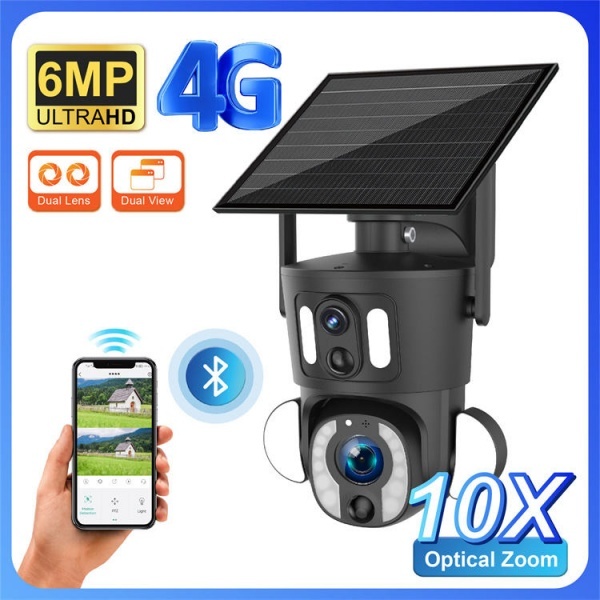Supply Chain Resilience: How UBOXCAM Navigates Global Challenges to Ensure Stable Delivery
In today’s volatile global market, a single disruption—be it a component shortage, a shipping bottleneck, or a geopolitical event—can halt your entire operation. For distributors, brand owners, and security installers, an unreliable supplier doesn’t just mean a delayed shipment; it means broken promises to customers, lost contracts, and a damaged brand reputation. The core pain point is uncertainty, which directly translates to business risk.
At UBOXCAM, we don’t just manufacture solar security cameras; we engineer supply chain certainty. With over a decade of experience navigating complex production landscapes, we have built a resilient framework designed to protect our partners from market volatility. This isn’t about luck; it’s about a deliberate, multi-layered strategy that ensures you receive your products on time, every time, without compromising on quality.
This article pulls back the curtain on our approach. We will detail the specific strategies we employ, from multi-source component procurement to agile manufacturing processes, that make us a reliable B2B partner in the security industry. Our goal is to transform your supply chain from a vulnerability into a competitive advantage.
The Anatomy of a Resilient Supply Chain in Security Camera Manufacturing
A resilient supply chain isn’t a single process but an interconnected ecosystem designed to anticipate, absorb, and adapt to disruptions. For a complex product like a 4G solar security camera, which involves optics, wireless modules, batteries, and processors, this is paramount. Our framework is built on four pillars that work in concert to ensure production continuity and stable delivery for our B2B clients.
First is **Strategic Component Sourcing**. We move beyond single-supplier dependencies. For critical components like image sensors, 4G/LTE modules, and battery management systems (BMS), we maintain active relationships and pre-qualified agreements with at least two to three vetted suppliers from different regions. This diversification is our first line of defense against regional lockdowns or manufacturer-specific shortages.
Second, we emphasize **Agile In-House Manufacturing**. By controlling key assembly and testing processes within our own facilities, we retain the flexibility to pivot production lines, reallocate resources, and implement quality control checks at every stage. This minimizes reliance on third-party assemblers whose priorities might not align with our clients’ deadlines. [SVG_CHART_1]
Third is **Intelligent Inventory Management**. We utilize a hybrid model of “Just-in-Time” and “Just-in-Case” inventory. While we keep assembly lines lean, we maintain a strategic buffer stock of long-lead-time and critical components. This buffer allows us to absorb unexpected demand surges or short-term supply shocks without impacting production schedules. It’s a calculated investment in our partners’ success.
Proactive Component Sourcing: Our Strategy for Mitigating Shortages
The global chip shortage of recent years was a stark lesson for the electronics industry. While many manufacturers ceased production, UBOXCAM continued to deliver. Our success was rooted in a proactive sourcing strategy that we’ve refined over 13 years. It’s more than just having a backup supplier; it’s about deep integration and technical foresight.
Our engineering team works hand-in-hand with our procurement department to pre-validate alternative components. For instance, if our primary 4G module supplier faces a 6-month lead time, we don’t just wait. We have already tested and certified a secondary module, ensuring its firmware is fully compatible with our UBOX platform and that its performance meets our stringent standards. This pre-validation means we can switch suppliers with zero development delay.
Furthermore, we establish long-term partnership agreements that give us priority allocation and transparent forecasting. We provide our core suppliers with a rolling 12-month demand forecast, allowing them to plan their own production. In return, they commit to holding dedicated inventory for us. This collaborative approach turns a simple transactional relationship into a strategic alliance, crucial for navigating supply volatility. For more details on the core technology we protect, see our analysis on how BMS is key for solar cameras.
In-House Control vs. Outsourcing: A Strategic Comparison
For many B2B buyers, the internal structure of their manufacturing partner is a black box. Yet, the degree of in-house control directly impacts product quality, customization capability, and supply reliability. Here’s a clear comparison between the typical outsourced model and the UBOXCAM integrated approach.
| Factor | Standard Outsourced Model | UBOXCAM’s Integrated Model |
|---|---|---|
| Quality Control | Relies on third-party QC reports; quality checks are often only at the final stage. | Multi-stage in-house QC: component ingress, sub-assembly, and final product testing. Full accountability. |
| Customization (OEM/ODM) | Slow and difficult. Requires coordinating with multiple external factories. | Fast and flexible. Our engineering, design, and production teams are under one roof, enabling rapid prototyping and changes. |
| Problem Resolution | Slow. Blame can be shifted between different contractors, delaying solutions. | Immediate and direct. Our engineers can directly address issues on the production line, ensuring swift resolution. |
| Supply Chain Visibility | Opaque. The client has little insight into component stock or production status. | Transparent. We provide clear production timelines and have real-time visibility into our component inventory. |
This integrated model is a conscious choice. It requires more investment in facilities and talent, but the payoff in reliability and quality control is a direct benefit we pass on to our partners.
Case Study: Navigating the 2021 Chip Shortage for a European Distributor
Theoretical strategies are valuable, but real-world execution is what matters. Let’s examine a specific case that highlights our resilience in action.
Problem: A major security products distributor in Germany, one of our long-term partners, was facing a crisis in Q3 2021. Their existing supplier for a popular 4G-enabled outdoor camera had suddenly declared a force majeure, citing an inability to procure essential processing chips. This left our partner with a three-month gap in their product lineup during a peak sales season, threatening their market share.
Solution: The distributor contacted us with an urgent request for 5,000 units of a comparable 4G solar PTZ camera, with custom firmware and branding. Our team immediately initiated our rapid response protocol. Our pre-vetted alternative chipset was allocated from our strategic buffer stock. Our in-house manufacturing lines were rescheduled to prioritize the order, and our firmware engineers worked directly with the client’s technical team to implement the required customizations in under a week.
Result: We completed the production run of 5,000 custom units in just 35 days—from initial request to final shipment. Our partner not only avoided a stockout but was able to launch a superior product ahead of their competitors. They reported a 40% increase in quarterly revenue for their security camera category and solidified their reputation as a reliable source for customers. This case perfectly illustrates how our supply chain resilience directly translates into our partners’ commercial success.
Future-Proofing Your Business: Key Questions to Ask Your Camera Supplier
Choosing a manufacturing partner is a long-term commitment. To protect your business from future disruptions, it’s critical to vet their supply chain capabilities. Here is a checklist of questions you should ask any potential supplier:
- Component Diversification: Do you have qualified, alternative suppliers for critical components like image sensors, SoCs, and 4G modules? Can you provide evidence of this?
- Inventory Strategy: What is your policy on holding buffer stock for long-lead-time components? How do you balance this with cost-efficiency?
- In-House Capabilities: Which parts of the manufacturing and testing process are done in-house versus outsourced? How does this affect quality control?
- Handling of Past Disruptions: Can you provide a specific example of how you managed a major supply chain disruption (like the COVID-19 lockdowns or chip shortages) for a client?
- Production Flexibility: How quickly can you scale production up or down in response to changes in my demand forecast?
- Transparency and Communication: What level of visibility will I have into my order’s production status and potential delays?
A supplier who can provide confident, detailed answers to these questions is one who takes supply chain resilience seriously. At UBOXCAM, we welcome these conversations as an opportunity to demonstrate our commitment to being a transparent and reliable partner.
The UBOXCAM Resilience Framework: A Summary
Our ability to deliver consistently, even amidst global uncertainty, is not accidental. It is the result of a meticulously designed and executed framework. This system ensures that from the moment you place an order to the final delivery, your business is shielded from the common points of failure in the global supply chain. [SVG_CHART_2]
Here are the key pillars of our resilience framework:
- Diversified & Vetted Supplier Base: We actively maintain and pre-qualify multiple suppliers for all critical components, mitigating single-point-of-failure risks.
- Strategic Buffer Inventory: We invest in holding a safety stock of crucial, long-lead-time parts to absorb unforeseen demand spikes or supply shocks.
- End-to-End In-House Control: By managing assembly, software integration, and multi-stage quality control in-house, we ensure accountability and agility.
- Modular Product Architecture: Our cameras are designed with a modular approach, allowing for the substitution of pre-validated alternative components without a full product redesign.
- Proactive Logistics Partnerships: We work with multiple top-tier global logistics partners to optimize shipping routes and avoid bottlenecks, ensuring the most efficient path from our factory to your warehouse.
This comprehensive framework is our promise to you. When you partner with UBOXCAM, you are not just buying a product; you are investing in a resilient supply chain designed to support your growth. To build a more stable and predictable supply for your security product line and explore our OEM/ODM capabilities, we invite you to schedule a consultation with our engineering team today.

